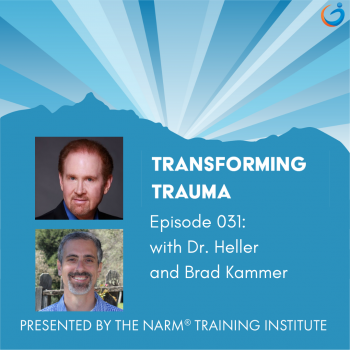Transforming Trauma Episode 031: NARM and Working in the Present Moment with Dr. Laurence Heller and Brad Kammer
A podcast brought to you by the NARM® Training Institute
In this special episode of Transforming Trauma, the NARM Training Institute presents an end-of-the-year gift to Transforming Trauma listeners: a special topic webinar from the NARM Inner Circle online program. This webinar provides a window into the Inner Circle learning community where helping professionals from around the world are coming together to learn more about the NARM approach to resolving Complex Trauma.
In this webinar, NARM and Working in the Present Moment, NARM creator, Dr. Laurence Heller, and NARM Senior Faculty Brad Kammer, explore how NARM uses a phenomenological approach, which relates to working in the here and now to resolve the psychobiological patterns of developmental trauma. NARM presents a unique way of addressing unresolved trauma that differs from many other treatments of trauma that rely on the stories or memories of trauma, or takes clients back into their past. NARM works with the complex patterns of adaptation to early trauma in the present moment and provides a hopeful treatment approach for anyone suffering from the effects of Adverse Childhood Experiences (ACEs) and Complex Post-Traumatic Stress Disorder (C-PTSD).
Laurence and Brad touch on such areas as:
- how childhood trauma patterns show up in the here and now
- working in the present moment with personal history and traumatic memories
- how to avoid trauma re-enactments and support trauma healing within the therapeutic relationship
- the spiritual dimensions of the NARM approach in supporting post-traumatic growth
NARM is a somatically-oriented model, and Laurence and Brad discuss the way that the body is viewed as a source of information for both the client and the therapist. The body lives and operates in the here-and-now, and with body awareness the client and therapist can identify patterns of tension and collapse, expansion and contraction, and connection and disconnection that arise in response to the content of the session.
NARM is also a psychodynamically-oriented model, and Laurence and Brad discuss the way that the mind organizes present life experience through the filters of the past. They both share their excitement of working with a therapeutic approach that integrates a “bottom-up” (somatic) and “top-down” (psychodynamic) approach. As Brad shares, “It works in both directions – that as people have more awareness they have more capacity being in the present moment, and as they’re more in the present moment they have more capacity to have awareness about the connection/disconnection process.”
When clients want to discuss things that have happened to them in the past, the NARM therapist does not disregard this, as it indicates that there are still elements that are unresolved from that experience. However, the focus is placed on how this event is affecting their lives in the present moment. As Laurence states, “So when we’re dealing with these unresolved issues from their history we’re always working with at least one foot in the present moment, so that we’re not reinforcing whatever the patterns were that developed in the past.”
NARM is also a relationally-oriented model. NARM Therapists direct attention on what is taking place in the present moment with their clients, including identifying any interpersonal patterns that are playing out within the session. Because childhood trauma took place in the context of relationships, working with early trauma patterns often evokes important relational material for the client (traditionally referred to as “transference”); as well as potentially important material for the therapist (traditionally referred to as “countertransference”). This is the “R” in NARM – supporting a relational approach to resolving patterns of developmental trauma. This allows the work of NARM to come alive.
NARM provides the theoretical context for this real-time change process, as well as the clinical skills that support the therapist to work more effectively with these complex dynamics in the present moment.
If you enjoyed this episode, we invite you to check out the NARM Inner Circle, where we host NARM Topic Webinars like this one every month. Some topics that we cover are: Differentiating Shock and Developmental Trauma; Working with Shame, Self-Hatred and Self-Sabotage; Complex Trauma and Addictions; Relational Trauma, Intimacy and Sexuality; Addressing Burnout in Helping Professionals; and the NARM Approach for Supporting Personal and Spiritual Growth.
To learn more about the Inner Circle and to sign up for a free two-week trial, please visit: www.narmtraining.com/freetrial

Subscribe for All Episodes
on your Favorite Service:
We want to connect with you!
Facebook @NARMtraining
Twitter @NARMtraining
YouTube
Instagram @thenarmtraininginstitute
Learn more about The NARM Training Institute: http://www.narmtraining.com
Sign up for a free preview of The NARM Inner Circle Online Membership Program: http://www.narmtraining.com/freetrial